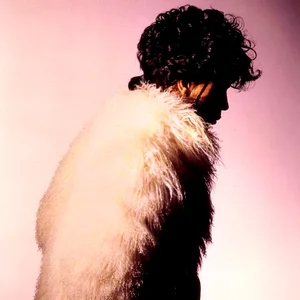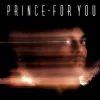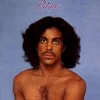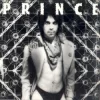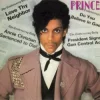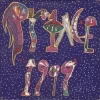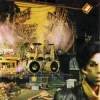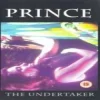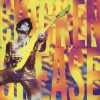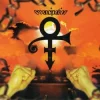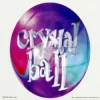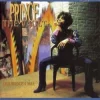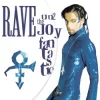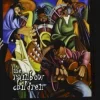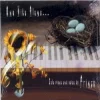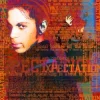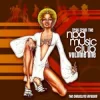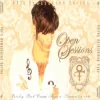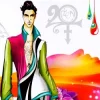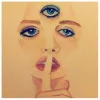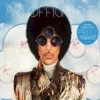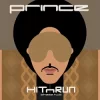Biography Prince
Prince Rogers Nelson (June 7, 1958 – April 21, 2016), known from 1993 to 2000 as an unpronounceable symbol (or, informally, 'The Artist Formerly Known as Prince', 'Tafkap', 'The Artist', etc), was a popular American musician. Known for his musical innovation, skill and prolificness, Prince was one of the best selling and critically acclaimed artists of the rock era, selling over 100 million records worldwide. He was inducted into the Rock and Roll Hall of Fame in 2004, the first year of his eligibility. During his career, Prince released 39 albums and 97 singles, including five U.S. number one hits: "When Doves Cry", "Let's Go Crazy", "Kiss", "Batdance" and "Cream".
During the 80s, Prince had comparable success with other 'mega-superstars' such as Michael Jackson, Whitney Houston, and Madonna in terms of star power and sales. Both individually and with his backing groups 'The Revolution' and 'The New Power Generation', Prince remained one of the world's most bestselling artists, even as his popularity waned since the mid-90s,
Few other musicians have matched the formidable breadth of his talents as a multi-instrumentalist performer, with his skills including not just singing and dancing but also composing, producing, and playing multiple instruments while directing videos and movies. In fact, Prince played nearly all the instruments on his first five albums and produced himself since signing with Warner Bros as a mere teenager. In terms of style, Prince's music spanned myriad genres and showed a debt to numerous past artists. From his early material, rooted in funk and soul, he constantly expanded his musical palette throughout his career, absorbing many other genres such as pop, rock, jazz, and hip-hop.
Prince garnered much critical acclaim, winning seven Grammy Awards, a Golden Globe, and an Academy Award. He was additionally inducted into the Rock and Roll Hall of Fame in 2004, the first year in which he was eligible. Born in Minneapolis, he based his entire career in Minnesota and helped codify what's known as the "Minneapolis sound". Toward the end of his life, he was reportedly residing in Los Angeles, California.
The distinctive characteristics of the early-to-mid 80s work that raised him to super-stardom involved industrial sounding drum machine arrangements as well as the use of synthesizer riffs to serve the role of horn riffs traditionally used in earlier R&B-related releases. That slick, often smooth musical ethos is known as "the Minneapolis sound". Prince additionally is famous for his reputation as a workaholic, having released over a thousand songs both under his own name and through other artists, and for having composed and recorded many more songs that remain unreleased. Regarded as a perfectionist, Prince had a reputation as being somewhat difficult to work with and for being highly protective of his music. He famously wrote, composed and produced most of his music single-handedly while also playing most of the instruments on his albums.
Born at Mount Sinai Hospital in Minneapolis, Minnesota to parents John L. Nelson and Mattie Shaw, he had a somewhat troubled childhood, with his parents divorcing when he was only seven. The story started in 1976, when Prince created a demo tape with producer Chris Moon in Moon's Minneapolis studio. Having trouble securing a recording contract but seeing clear potential in Prince's sound, Moon brought the tape to Minneapolis businessman Owen Husney. Husney signed Prince, at the mere age of seventeen, to a management contract and, with producer/engineer David Z, helped Prince create a demo recording at Sound 80 Studios in Minneapolis. The demo recording, along with a press kit produced at Husney's ad agency, resulted in interest from several record companies. With the help of Husney, Prince signed a recording contract with Warner Bros. The label agreed to give Prince creative control for three albums as well as ownership of the publishing rights.
Having experienced the local scene while playing in a band called Grand Central along with other students attending Minneapolis's Central High School, Prince then aimed for the big time. His first two albums were solid, if unremarkable, late-'70s funky pop releases. Coming after a move to Sausalito, California, Prince's debut studio album, titled 'For You', was recorded at Record Plant Studios and released in 1978. With Prince playing all twenty-six instruments featured on the album himself, the aptly titled single "Soft and Wet" became a minor hit and pointed the way forward.
With the 1980 'Dirty Mind', Prince recorded his large-scale hit album, a work regarded by fans and many critics as a one-man tour-de-force of sex and music. The release featured hard-edged funk, catchy melodies reminiscent of The Beatles, soul ballads, and guitar-driven pop rock, all on the same album. Numerous critics have praised the work over the years, with Pitchfork Media ranking 'Dirty Mind' number 87 on its list of the 'Top 100 Albums of the 1980s'.
The follow-up, 'Controversy', continued on with the same musical vibe. With songs wading into social and political commentary - the album's cover even referencing gun control whilst quoting the Bible - the album earmarked Prince for something bigger. 1982's release, '1999' , solidified Prince's place in the charts. It was Prince's fifth full studio album, and sold over three million copies in the U.S. and internationally. Prince's induction into the Grammy Hall of Fame in 2008, '1999' seemed to throw genre-labels out the window.
The music video for the single "Little Red Corvette" proved to be popular, notably being one of the first music videos by an African-American artist to be played on MTV alongside Michael Jackson's "Billie Jean". Other songs such as "1999" filled dance floors from city to city and showed a synthpop driven side that brought Prince an even larger fanbase. His skilled live tours showcased a group of talented backing musicians that he dubbed ''The Revolution', and included artists that went on to other prominent endeavors.
Then came what is regarded as Prince's masterpiece, 1984's 'Purple Rain', which at its height was selling over one million copies per week in the U.S. alone. The release spun off several number one records and top ten hits. All this, not to mention the #1 blockbuster hit movie of the same name, turned Prince from a mere popular performer into an international icon. The 'Purple Rain' album did so well that it spent an astonishing 24 weeks at number one.
By 1996, Purple Rain easily surpassed the esteemed RIAA Diamond Certification (which is earned after selling at least 10 million domestic units). Prince matched his studio acclaim with the eclectic talent of his touring band. He and his group zig-zagged the nation to the delight of his many fans.
Prince had plunged himself into a pool of the most pop-oriented music he has ever made, the emotionally thrilling and reflective lyrics in tracks such as "Let's Go Crazy" matching their sonic energy. Instead of continuing in this accessible direction, however, Prince and the Revolution decided to shift gears, and the group veered off into the psychedelic rock and avant-garde-inspired world of 'Around the World in a Day'. Although some commentators opined that Prince's success may have already peaked, the album nevertheless zoomed to number one on the album chart and sold over three million copies.
Coming out on April 22, 1985, that release contains the critically acclaimed tunes "Raspberry Beret" and "Pop Life", which were noted for their strong, sophisticated story-telling lyrics and became top 10 hits. As a whole, though, the less pop-friendly album challenged many listeners even while receiving general praise from many music critics. With songs featuring cryptic religious imagery as well as a mixed tapestry of instrumentation, putting chime bells alongside guitars, 'Around the World in a Day' the album signalled Prince's desire to wade into more ambiguous, darker territory, exploring personal identity and sexuality as he would do in later works.
In 1986, Prince released 'Parade'. In its own way, fans viewed it as ambitious and intricate as any art rock exploration of the 60s and 70s. Yet those albums were never grounded with a super hit as brilliant as the rock and funk fusion of "Kiss". Several entities such as 'Rolling Stone', 'Billboard', and 'New Musical Express' ranked the song near the top of their list of the greatest singles of all time. "Kiss" rocketed right to number one (pushing out another huge chart topper by rockers The Bangles, "Manic Monday", that ironically enough was also composed by Prince) and remained there for several weeks.
Prince's musical associates, including the female duo Wendy & Lisa, had had the opportunity to shine for themselves, and they played a significant role with the release. Numerous critics ate up the album as a whole, with the 'Detroit Free Press' speaking for many when the publication called it "a confirmation of Prince's place as a superior melodist, arranger, and player, as well as a celebration of his creativity." 'Parade' sold several million copies, doing particularly well in Europe, and was used as the soundtrack to Prince's second movie.
However, that film, titled 'Under The Cherry Moon', proved to be a complete bomb. The casting of Prince as a villain, a vindictive swindler no less, provided a stark contrast to the heroic, coming-of-age role of Prince in the 'Purple Rain' flick. The film failed to earn back its budget. Though somewhat chastened, Prince still felt immense ambitions musically and visually.
Prince, his dreams growing by leaps and bounds, felt inspired to release a double-album. Backing group 'The Revolution' disbanded. as Prince released the sprawling masterpiece 'Sign o' the Times' on March 31, 1987. Numerous critics praised the work, and it earned the #16 rank in 'New Musical Express' magazine's list of the 'All Time Top 100 Albums' as well as the #3 slot in 'Hot Press' magazine's list of the '100 Best Albums of All Time'.
Prince had embraced a musical vibe enriched with socially conscious commentary and a soulful pop style. However, he felt inspired to undertake another hard turn with his next work, once again veering off into another direction. Prince became set to release the abrasive funk of 'The Black Album' by the end of the year, an album featuring 'negative' elements from casual profanity to lyrics detailing a murder. Prince withdrew the album just before its full release, deciding it was too dark and immoral after what he later described as a 'spiritual epiphany'. The aborted album has since been a popular bootleg item, eventually receiving a belated formal release years later.
Instead, Prince released the confused 'Lovesexy' in 1988. Though not received as well as his previous material, with its cover (featuring a naked Prince) becoming an object of ridicule, it remains a fan favourite and has picked up several staunch critical defenders. The soundtrack to 1989's 'Batman' rejuvenated Prince's fortunes; he returned to the top of the charts with gusto. Even if the album was essentially a recap of everything he had done before, Prince had left his stamp as a cultural icon with a timeless appeal. The blockbuster film itself, as much a part of cinema history as 'Purple Rain', even featured the iconic villain the Joker dancing to Prince's track "Partyman".
The following year, Prince released 'Graffiti Bridge', the soundtrack to the film of the same name. That movie, a sequel to 'Purple Rain', turned out to be a considerable disappointment. Despite this, the album picked up serious acclaim, viewed as a return to the catchy punch of Prince's mid-80s work. The release hit the number one slot on the U.K. Albums Chart and also did very well domestically.
In 1991, Prince formed what he dubbed "The New Power Generation", the most versatile backing group that he had ever assembled. With their first album, 'Diamonds and Pearls', Prince reasserted his mastery of contemporary R&B. The album became his biggest hit since 1985, with the song "Cream" being a worldwide smash. Other tunes such as "Money Don't Matter 2 Night" and "Diamonds and Pearls" earned major praise.
On October 13, 1992, Prince released his twelfth studio album, which was titled with a cryptic symbol; in 1993, Prince legally changed his name to the symbol (dubbed by many as 'the love symbol'). Even longtime fans appeared baffled by the artist's behaviour. Though ever the eccentric, Prince succeeded, with New Power Generation group fuelling his desires, to create a new master-work. Exploring elements of hip-hop as well as dance pop and more, 'The Love Symbol Album' earned huge support from many critics, with Allmusic's Stephen Thomas Erlewine aptly remarking that the album "has some of the finest, most inventive music of Prince's career."
In 1994, after becoming embroiled in contract disagreements with Warner Bros., Prince independently released the single "The Most Beautiful Girl in the World," illustrating what he was capable of on his own. The song became his biggest hit single in years. Later that summer, Warner released the halfhearted 'Come' under the name of Prince. The record was a moderate success commercially, yet its mediocre sound and the fractious situation behind its creation seemed to darkly portend how Prince's career would proceed.
In November 1994, as part of a contractual obligation, Prince agreed to the official release of 'The Black Album'. The artist's concerns about the album proved right as many fans didn't quite know what to make of it. In early 1995, he immersed himself in another legal battle with Warner, feeling animated enough about the conflict to appear in public with the word "slave" on his cheek. Prince's business-related issues fuelled anticipation for when his new record, titled 'The Gold Experience', would finally see a release.
By the end of the summer, a fed-up Warner had negotiated a compromise which guaranteed the album's release, plus one final record for the label. 'The Gold Experience' came out in the fall. Although it received rave reviews and had a smash single to support it, the release failed to catch fire commercially as much as his previous albums. However, it remains a fan favourite for many Prince aficionados. Singles "I Hate U" and "Gold" also became popular hits due to their infectious feel.
In the summer of 1996, Prince released 'Chaos & Disorder', which freed him to become an independent artist. The album received a fractious response; its title aptly labelled it as a messy rock and roll inspired release, with the album pleasing listeners yet failing to achieve have the magic of his previous 90s work. Setting up his own label, NPG (which was distributed by EMI), Prince resurfaced later that same year with the three-disc 'Emancipation', which was designed as a new magnum opus that would spin off singles for several years and be supported with several tours.
However, even his devoted following needed considerable time to digest such an enormous compilation of songs, and Prince's ability to appeal to the musical mainstream seemed to have faded. Once it was clear that 'Emancipation' wasn't the commercial blockbuster that he hoped it would be, Prince assembled a long-awaited collection of outtakes and unreleased material, titling it 'Crystal Ball', in 1998. With 'Crystal Ball', Prince discovered that it was much more difficult to get records out to an audience than it seemed. Some fans who pre-ordered their copies through Prince's website (from which a bonus fifth disc was also included) didn't receive them until months after the set began appearing in stores. Just three months later, Prince released a new one-man album, 'New Power Soul' (also known as 'Newpower Soul'. Even though it was musically his most straightforward album in several years, it didn't do well in the charts - partly because many listeners didn't realize it had been released!
Despite being a gigantic figure in the music world during the 80s and into much of the 90s, the esoteric nature of Prince's work and the scatter-shot nature of its releases proved to be signs that his commercial success and impact on popular culture had significantly waned. Several critics panned 'New Power Soul' as a pleasant yet pedestrian listen that showed the former master just going through the motions. Numerous fans considered it his worst album, an assessment still held years later.
A year later, with "1999" - a predictably an end-of-the-millennium - Prince prominently issued a new remix collection featuring the still appealing track. Though at the heels of what seemed like a substantial return to fame, a great deal of listeners felt hungry for brand-new material from Prince rather than mere remixes. He apparently alienated many fans by suing a popular fan magazine based on his work. A collection of Warner Bros.-era leftovers, 'Vault: Old Friends 4 Sale', received an August 24, 1999 release. On November 9, 1999, Prince came out with 'Rave Un2 the Joy Fantastic', a release paring him with many famous fellow musicians. Neither album sold particularly well.
In the fall of 2001, Prince released the controversial 'Rainbow Children' album, a jazz-infused circus of sound trumpeting his conversion to the Jehovah's Witnesses religious sect. Though religious and spiritual material were far from rare in Prince's previous work, the nature of his preaching and the overall tone of the release turned off general audiences. Some commentators opined that he had reached a point in which he had decided to record music only for himself and not for anyone else.
Prince further isolated himself with 2003's 'N.E.W.S.', a four-song set of instrumental jams unlike the vast majority of his past releases. Several critics remarked that the album sounded a lot more fun to play than to listen to. A great number of fans and critics alike considered it his second worst or very worst release. Prince's fortunes appeared to have changed irrevocably.
Thankfully, Prince re-bounded with the chart-topping 'Musicology', a return to form that found the artist back in the top ten. He re-embraced the same vibrant, soul and rnb fuelled sound that had brought him large scale success back in the early 90s. In 2004, Prince was inducted into the Rock and Roll Hall of Fame, and he also performed at the Grammy Awards with fellow star Beyonce Knowles.
On December 9, 2005, the news came out that Prince had devised an agreement with Universal Records to release his next album, titled '3121'. This deal, commentators remarked, seemed similar to that which the artist had struck with Columbia Records for 'Musicology'. The debut single put forward from the album was the Latin-tinged “Te Amo Corazon,” the video for which debuted on VH1 on December 13, and was directed by actor Salma Hayek. The piece was filmed in Marrakesh, and showed Prince accompanied on-screen by Mía Maestro. She was also present at a brief press conference which Prince made in promotion of the new single and video. The video for “Black Sweat,” the second single from '3121', premièred on February 2, 2006, demonstrating a more minimalist approach both in the sound of the song and the style of the video.
In February 2006, Prince was the musical guest on Saturday Night Live, coming in after a 25 year gap between appearances. He performed two new songs. The guitar-driven “Fury” joined the tune “Beautiful, Loved & Blessed", the latter featuring the then up-and-coming R&B singer Támar. Both songs being featured on '3121', Prince consented to “Beautiful, Loved & Blessed” also appearing on Tamar’s album of the same title. That same month, Prince performed at the Brit awards alongside Wendy, Lisa and Sheila E, wowing the crowd with what was generally regarded as the best performance of the night.
'3121' ended up giving Prince his first career number-one début on the Billboard 200, impressing fans and reassuring general audiences that his comeback would not be temporary. The set sold 183,000 copies in the U.S. alone in its first week, according to Nielsen SoundScan. It also débuted at number one on Billboard’s Top R&B/Hip-Hop Albums chart as well as claiming the number one spot on Billboard's European Top 100 Albums chart the following week, giving the legendary artist his highest charting international album of the decade.
On May 24, 2006, Prince performed the songs “Lolita” and “Satisfied” on the last results show of the fifth season of American Idol. He was the only artist to perform without any contestant in the episode. The infamous judge on the show, Simon Cowell, turned his barbed comments toward Prince, remarking, “It just tells you how selfish he is. He comes on, not a word—‘I’m not gonna sing with anybody else, I’m not gonna say goodbye.’ Thank you for your generosity, Prince.”
On June 12, 2006, Prince was honoured with a Webby Lifetime Achievement Award in recognition of his "visionary" use of the Internet that included becoming the first major artist to release an entire album -1997's "Crystal Ball" - exclusively on the Web. "Everything you think is true," Prince said, coming in under the five-word limit and leaving everyone wondering what he meant as he launched into a solo number. The performance ended abruptly as he suddenly threw his guitar back over his head and raced off to a waiting limousine.
On June 27, 2006, Prince appeared at the BET awards. He was awarded Best Male R&B artist. In his acceptance speech he told the crowd that he was surprised but honoured to receive the award. He also thanked Jehovah, Chaka Khan, Stevie Wonder, India Arie, and Yolanda Adams. Later in the evening Prince participated in a tribute to Chaka Khan with the other artists he had named in his speech. The tribute was part of Chaka Khan's lifetime achievement award given to her that evening. Prince also closed the show, alongside Támar, with his song "3121" from his album of the same name. He was joined onstage by musician will.i.am from The Black Eyed Peas.
On June 28, 2007, the UK national newspaper 'The Mail on Sunday' revealed that it had made a deal to give Prince's new album Planet Earth away for free with an "imminent" edition of the paper, making it the first place in the world to get the album. The date chosen was July 15, 2007. The move sparked controversy among music distributors and led the UK arm of Prince's distributor, Sony BMG, to withdraw distribution of the album from UK stores. The UK's largest high street music retailer, HMV, decided to stock the paper on release day due to the giveaway.
In August and September of 2007, Prince played 21 nights over 2 months in London's o2 Arena, including many aftershow parties where he would play for up to 3 hours. He also released a book called "21 Nights" which featured professional photos of the concerts, photoshoots and poems written by Prince himself.
In the spring of 2009 Prince released two albums: LOtUSFLOW3R and MPLSoUND.
He released two new albums in 2014; one solo -Art Official Girl - and PLECTRUMELECTRUM with 3rdeyegirl.
Looking backward, few artists have created a body of work as rich and as varied as Prince. His genius was critically agreed. He emerged during the 80s as one of the singular talents of the modern musical era, capable of seamlessly tying together pop, funk, rock and more. Not only did he release a series of ground-breaking albums, he toured frequently, produced albums and wrote songs for many other artists. He recorded hundreds of songs that still lie unreleased in his vaults. With each album he released, Prince showed remarkable stylistic growth and musical diversity, constantly experimenting with different sounds, textures, and genres. Occasionally, his music can be maddeningly inconsistent because of this eclecticism, but his experiments frequently succeed. Few other contemporary artists could or can blend so many diverse styles into a cohesive whole.
Prince died 21st April, 2016 from an accidental overdose of the prescription drug fentanyl.
Creative Commons By-SA License
 FM
FM
